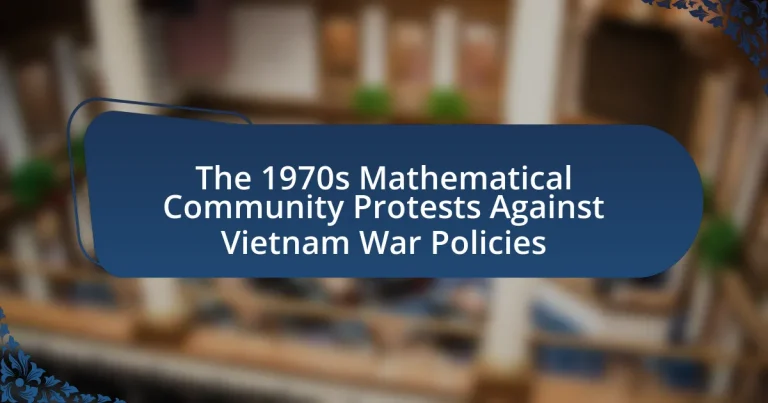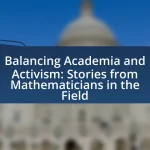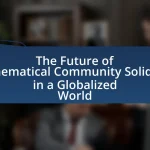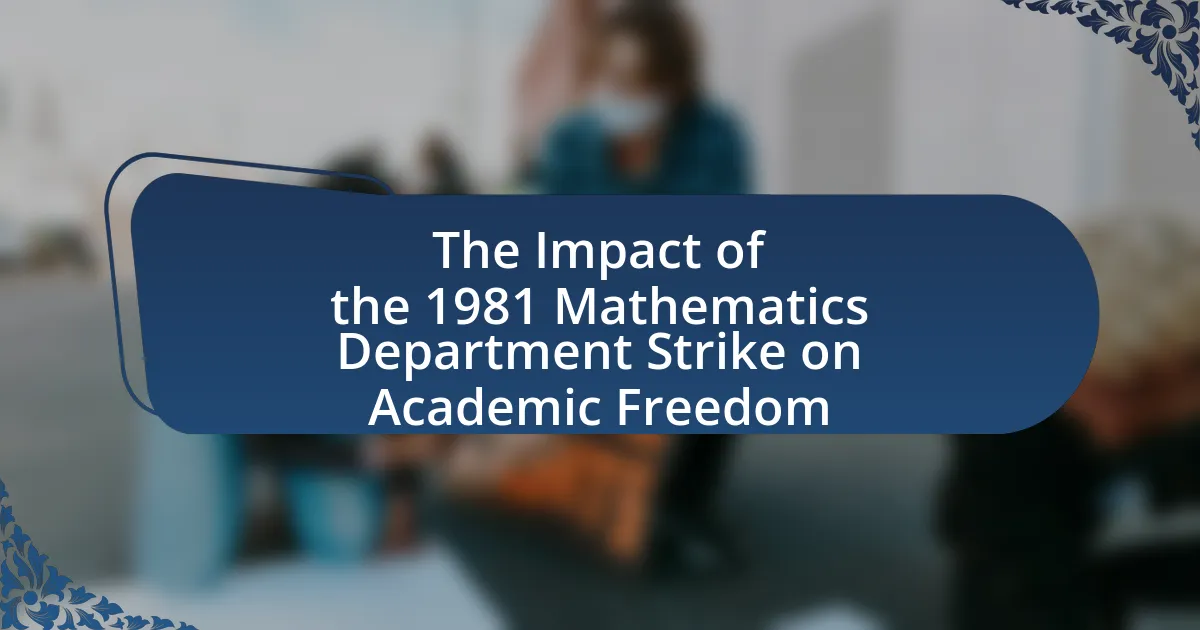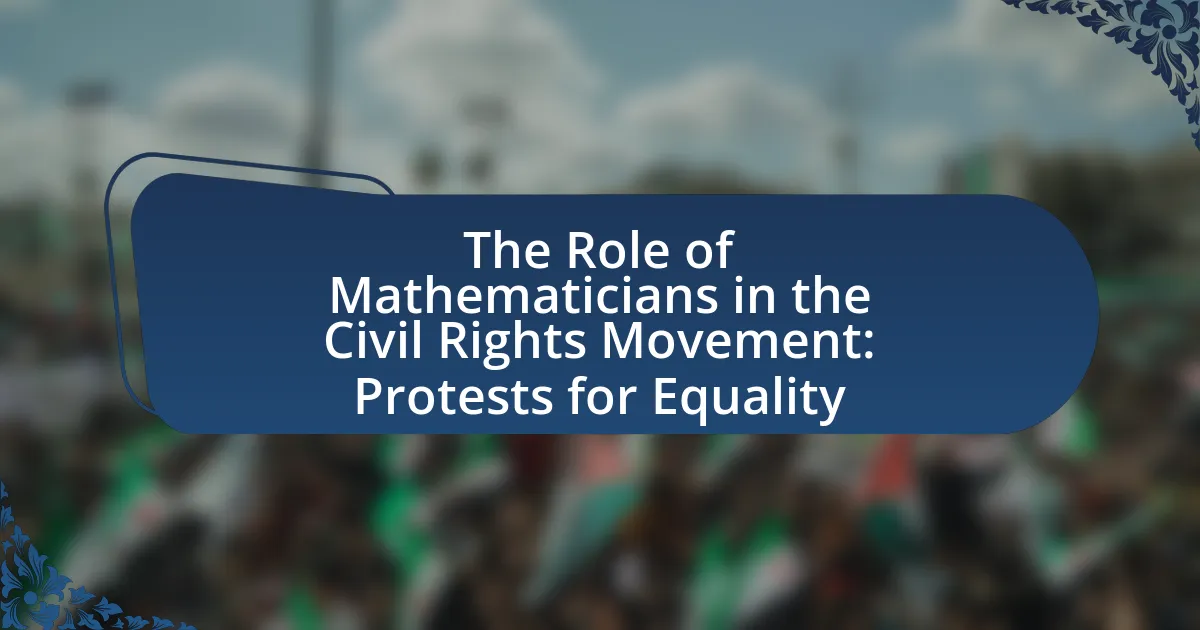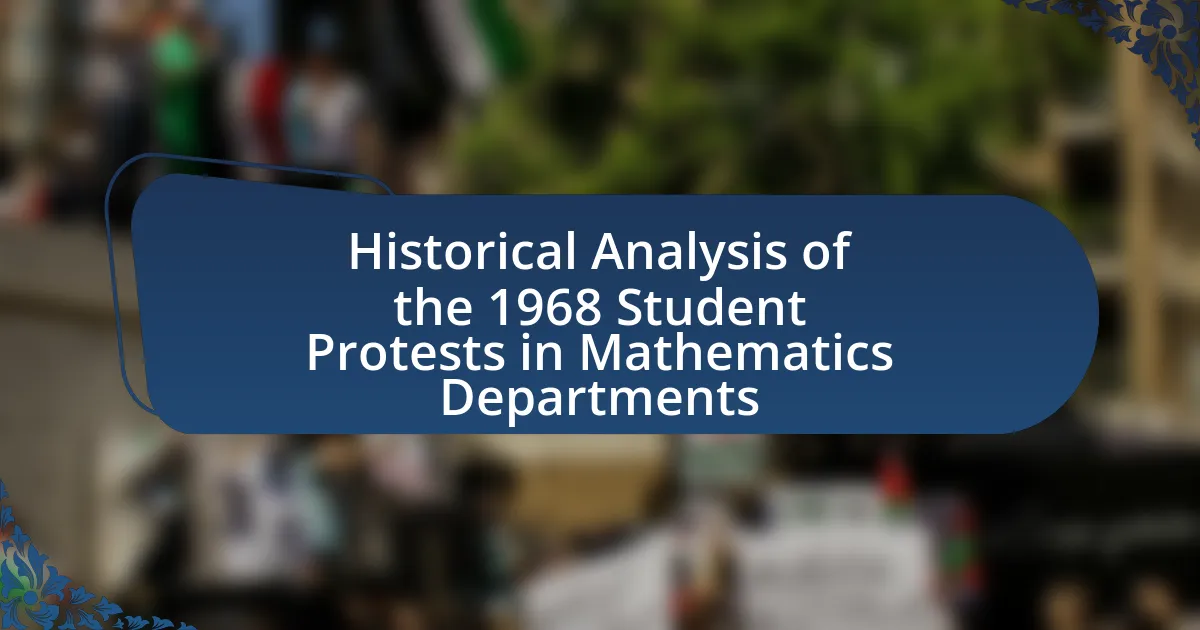The article examines the 1970s Mathematical Community Protests Against Vietnam War Policies, highlighting the motivations behind these protests, including opposition to the war and concerns over the ethical implications of mathematical research in military applications. It discusses the significant impact of the Vietnam War on the mathematical community, detailing specific events that triggered protests and the moral responsibilities perceived by mathematicians. The article also outlines the forms of protest utilized, the role of academic institutions, and the collaborations between mathematicians and other activist groups. Additionally, it explores the outcomes of the protests, including shifts in public perception, changes in mathematical research and education, and the long-term effects on the community’s engagement with social and political issues.
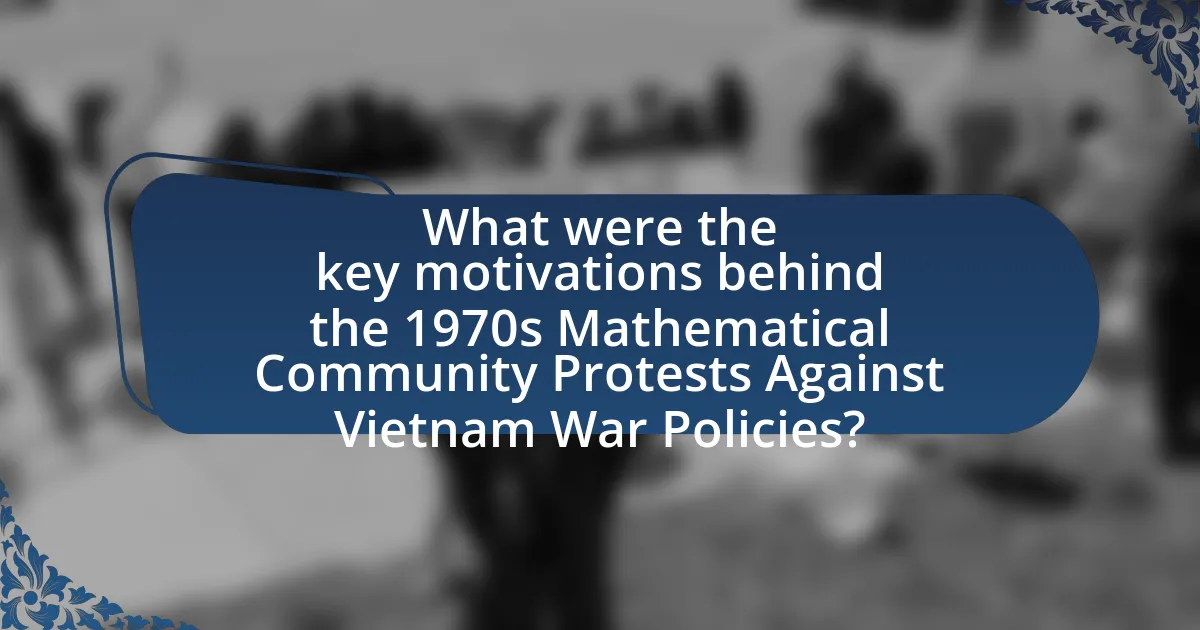
What were the key motivations behind the 1970s Mathematical Community Protests Against Vietnam War Policies?
The key motivations behind the 1970s Mathematical Community Protests Against Vietnam War Policies were a strong opposition to the war and a desire to advocate for social justice. Mathematicians and academics were particularly concerned about the ethical implications of their research being used for military purposes, as many were involved in projects that contributed to the development of technologies used in warfare. The protests were fueled by a broader anti-war sentiment prevalent in society, which included a push for peace and a call for the academic community to take a stand against government policies that they viewed as unjust. This movement was exemplified by the 1970 open letter signed by over 1,500 mathematicians, which explicitly condemned the war and urged for a reevaluation of the role of scientists in military applications.
How did the Vietnam War impact the mathematical community?
The Vietnam War significantly impacted the mathematical community by prompting widespread protests against military involvement and the use of mathematical research in warfare. Many mathematicians, including prominent figures like John Nash and Paul Erdős, became vocal critics of the war, leading to the formation of organizations such as the Mathematical Society for Social Responsibility. These protests highlighted ethical concerns regarding the application of mathematics in developing military technologies, particularly in areas like operations research and cryptography. The backlash against the war also fostered a greater emphasis on the social responsibilities of scientists and mathematicians, influencing educational curricula and professional practices in the years that followed.
What specific events triggered protests within the mathematical community?
Protests within the mathematical community during the 1970s were primarily triggered by the involvement of mathematicians in the Vietnam War, particularly through the use of mathematical research in military applications. The publication of the Pentagon Papers in 1971 revealed the extent of U.S. government deception regarding the war, prompting mathematicians to question their role in supporting military efforts. Additionally, the establishment of the Mathematical Sciences Research Institute in 1975, which was partially funded by military contracts, further fueled dissent among mathematicians who opposed the war. These events collectively galvanized the community to advocate for peace and to distance themselves from military involvement.
How did mathematicians perceive their role in relation to the war?
Mathematicians perceived their role in relation to the Vietnam War as one of moral responsibility and social activism. Many believed that their expertise in mathematics could contribute to the war effort, but they also recognized the ethical implications of their work, particularly in relation to military applications. This duality led to significant protests within the mathematical community during the 1970s, where mathematicians openly opposed the war and sought to distance their discipline from military funding and projects. For instance, prominent mathematicians like John Nash and Paul Erdős expressed their discontent with the use of mathematical research in warfare, advocating for a more peaceful application of their skills. This perception was rooted in a broader cultural shift during the 1960s and 1970s, where intellectuals increasingly questioned the moral implications of their contributions to society.
What were the main arguments presented by the protesters?
The main arguments presented by the protesters in the 1970s Mathematical Community Protests Against Vietnam War Policies included opposition to the military funding of research, the ethical implications of mathematicians contributing to war efforts, and the call for academic institutions to take a stand against the war. Protesters argued that government funding for research should not support military applications, as evidenced by the significant financial resources allocated to defense-related projects, which detracted from peaceful scientific endeavors. Additionally, they highlighted the moral responsibility of mathematicians to use their skills for humanitarian purposes rather than for warfare, emphasizing that their work could contribute to social justice and peace rather than conflict.
What ethical considerations influenced the protests?
The ethical considerations that influenced the protests included opposition to the Vietnam War, the moral implications of military involvement, and the responsibility of intellectuals to advocate for peace. Protesters believed that the war caused unnecessary suffering and loss of life, which contradicted their ethical values of promoting human welfare and social justice. Additionally, many in the mathematical community felt a duty to use their knowledge and skills to challenge policies that they viewed as unjust, reflecting a broader commitment to ethical responsibility in academia and society.
How did the protesters articulate their opposition to the war?
Protesters articulated their opposition to the Vietnam War through organized demonstrations, public speeches, and the dissemination of literature that highlighted the war’s moral and ethical implications. They utilized mathematical frameworks to critique the war, emphasizing the disproportionate loss of life and resources. For instance, prominent mathematicians and academics publicly denounced the war, arguing that it diverted funding from essential social programs and education. This articulation was evident in events such as the 1970 Mathematical Community Conference, where participants openly discussed the war’s impact on society and called for peace.
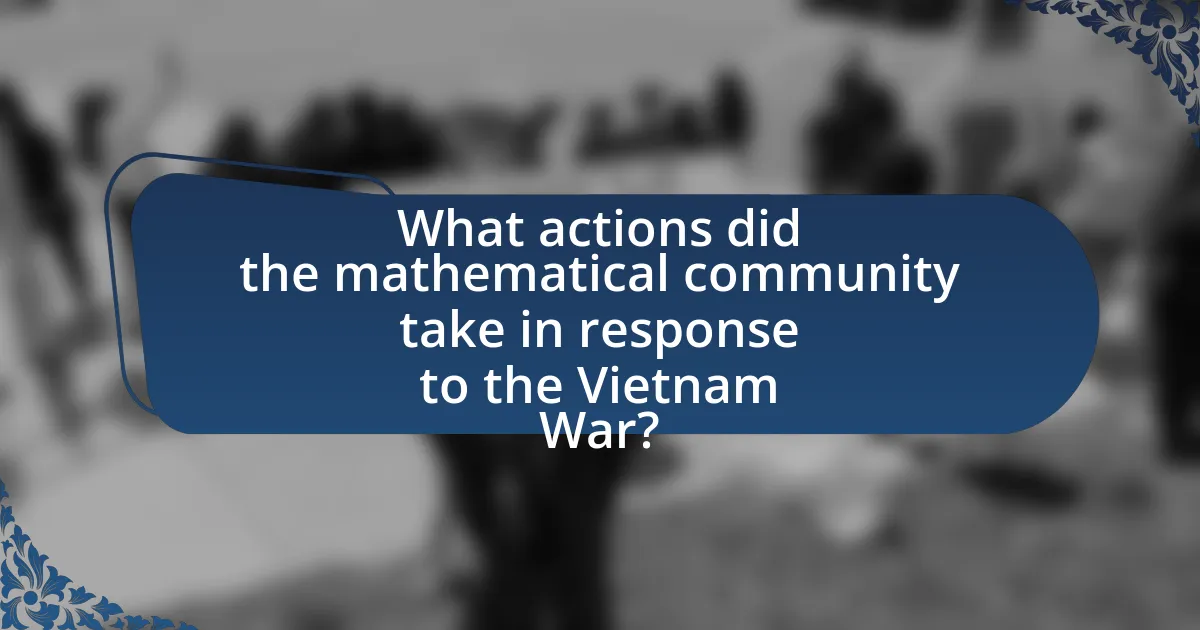
What actions did the mathematical community take in response to the Vietnam War?
The mathematical community organized protests and issued statements against the Vietnam War, reflecting their opposition to the conflict. In 1969, the American Mathematical Society (AMS) passed a resolution condemning the war and advocating for peace. Additionally, mathematicians participated in anti-war demonstrations, contributing to broader social movements. Notably, prominent mathematicians like John Nash and Paul Erdős publicly expressed their dissent, highlighting the community’s engagement in political activism during this period. These actions demonstrated a collective stance against the war, emphasizing the ethical responsibilities of scientists and mathematicians in society.
What forms of protest were utilized by mathematicians?
Mathematicians utilized various forms of protest during the 1970s against Vietnam War policies, including public demonstrations, open letters, and organized petitions. Notably, the American Mathematical Society (AMS) and other groups issued statements condemning the war, while mathematicians participated in marches and rallies to express their opposition. These actions were aimed at raising awareness and influencing public opinion regarding the ethical implications of the war, reflecting a broader movement within academia to engage in social and political issues.
How did public demonstrations manifest within the mathematical community?
Public demonstrations within the mathematical community during the 1970s manifested primarily through organized protests, petitions, and public statements against the Vietnam War policies. Mathematicians, including prominent figures like John Nash and Paul Erdős, participated in rallies and signed open letters advocating for peace and the cessation of military funding in academia. These actions were often coordinated by groups such as the Mathematical Society for Social Responsibility, which highlighted the ethical implications of mathematical research being used for military purposes. The involvement of mathematicians in these demonstrations reflected a broader societal engagement, as they sought to leverage their intellectual authority to influence public opinion and policy regarding the war.
What role did academic institutions play in these protests?
Academic institutions served as critical platforms for organizing and mobilizing protests against Vietnam War policies during the 1970s. Universities became hubs for anti-war activism, where faculty and students collaborated to challenge government actions through teach-ins, rallies, and public demonstrations. For instance, the University of California, Berkeley, was instrumental in fostering a culture of dissent, hosting events that drew thousands and encouraging discourse on the ethical implications of the war. Additionally, academic publications and forums provided a means for scholars to disseminate anti-war literature, further amplifying the movement’s reach and impact.
How did the protests affect the broader anti-war movement?
The protests significantly galvanized the broader anti-war movement by increasing public awareness and mobilizing diverse groups against the Vietnam War. The mathematical community’s protests, particularly in the early 1970s, highlighted the ethical implications of academic involvement in military research, which resonated with a wider audience concerned about the war’s morality. This led to a surge in anti-war activism, as evidenced by the rise in participation in demonstrations and the formation of coalitions among various professional and social groups, ultimately contributing to a more unified and vocal opposition to U.S. military policies.
What collaborations occurred between mathematicians and other activist groups?
Mathematicians collaborated with various activist groups during the 1970s protests against Vietnam War policies, notably aligning with organizations such as the Students for a Democratic Society (SDS) and the American Mathematical Society (AMS). These collaborations included joint demonstrations, public statements, and the organization of teach-ins that highlighted the ethical implications of mathematical research in military applications. For instance, mathematicians participated in anti-war rallies organized by SDS, where they used their expertise to critique the use of mathematical models in warfare. Additionally, the AMS issued statements condemning the war, reflecting the collective stance of mathematicians against military involvement. These actions exemplified the intersection of mathematics and activism, showcasing how the mathematical community engaged with broader social issues during this tumultuous period.
How did the protests influence public perception of mathematicians?
The protests significantly shifted public perception of mathematicians from being seen primarily as abstract thinkers to being recognized as socially engaged individuals. This change occurred as mathematicians publicly opposed the Vietnam War, demonstrating their commitment to ethical considerations in their work. For instance, prominent mathematicians like John Nash and others participated in demonstrations, which highlighted their willingness to confront political issues. This activism led to a broader understanding that mathematicians could contribute to societal debates, thereby enhancing their visibility and relevance in public discourse.
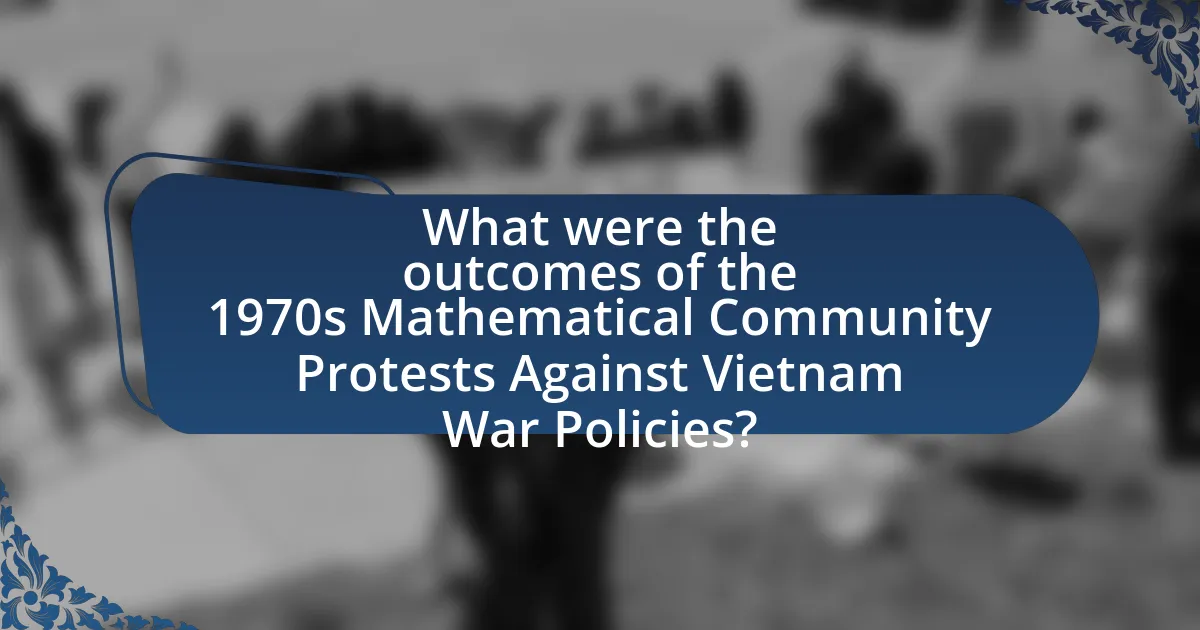
What were the outcomes of the 1970s Mathematical Community Protests Against Vietnam War Policies?
The outcomes of the 1970s Mathematical Community Protests Against Vietnam War Policies included increased awareness of the ethical implications of mathematics in warfare and a shift towards advocating for social responsibility among mathematicians. These protests led to the establishment of organizations such as the Mathematical Association of America and the American Mathematical Society, which began to address the role of mathematics in military applications. Additionally, the protests contributed to a broader movement within academia to reconsider the relationship between research funding and military interests, ultimately influencing policies regarding academic freedom and ethical research practices.
What changes occurred within the mathematical community post-protests?
Post-protests, the mathematical community experienced a significant shift towards increased activism and social responsibility. Mathematicians began to engage more actively in political issues, advocating for peace and ethical considerations in their work. This change was evidenced by the formation of organizations such as the Mathematical Association of America and the American Mathematical Society, which started to address social issues and promote the use of mathematics for societal benefit. Additionally, there was a notable increase in the number of mathematicians participating in public discourse, reflecting a broader commitment to applying mathematical expertise to real-world problems, particularly in relation to war and peace.
How did the protests impact the careers of involved mathematicians?
The protests significantly impacted the careers of involved mathematicians by leading to both professional advancements and setbacks. Many mathematicians who participated in the protests gained recognition for their activism, which enhanced their reputations within academic circles and led to increased opportunities for collaboration and funding. For instance, prominent figures like John Nash and Paul Erdős saw their work gain more visibility due to their involvement in social issues. Conversely, some mathematicians faced backlash from institutions or colleagues who opposed their political stance, resulting in job loss or diminished career prospects. The dual nature of these outcomes illustrates how activism during the protests shaped the professional landscape for mathematicians in the 1970s.
What long-term effects did the protests have on mathematical research and education?
The long-term effects of the protests against Vietnam War policies on mathematical research and education included a significant shift towards social responsibility within the mathematical community and increased advocacy for ethical considerations in research. These protests prompted mathematicians to critically evaluate the implications of their work, leading to the establishment of organizations such as the Mathematical Association of America, which emphasized the importance of ethics in mathematics education. Additionally, the protests fostered a greater awareness of the relationship between mathematics and societal issues, influencing curricula to incorporate discussions on the social impact of mathematical applications. This shift is evidenced by the integration of topics such as mathematical modeling in social sciences and the promotion of interdisciplinary studies that connect mathematics with ethics and public policy.
What lessons can be learned from the protests for future activism?
The protests of the 1970s by the mathematical community against Vietnam War policies demonstrate the importance of solidarity and interdisciplinary collaboration in activism. These protests highlighted that when diverse groups unite for a common cause, they can amplify their impact, as seen when mathematicians, scientists, and students collectively opposed the war, leading to significant public discourse and policy reconsideration. Additionally, the protests underscored the necessity of clear communication and strategic messaging; the mathematical community effectively utilized their expertise to articulate the ethical implications of war, which resonated with broader audiences. This approach is supported by historical evidence showing that well-organized and articulate movements can influence public opinion and policy, as seen in the eventual shift in U.S. military engagement in Vietnam.
How can current mathematicians engage in social and political issues effectively?
Current mathematicians can engage in social and political issues effectively by applying their analytical skills to advocate for data-driven policies and social justice initiatives. They can utilize mathematical modeling to address complex societal problems, such as climate change or healthcare disparities, thereby providing evidence-based solutions that inform public policy. For instance, mathematicians can analyze statistical data to highlight inequalities, as seen in the work of mathematicians like John Nash, who contributed to game theory applications in economics and social sciences. By collaborating with interdisciplinary teams, mathematicians can ensure that their expertise is integrated into broader discussions, thus amplifying their impact on social and political issues.
What strategies from the 1970s protests can be applied today?
Strategies from the 1970s protests, such as grassroots organizing, coalition-building, and leveraging academic platforms for advocacy, can be effectively applied today. Grassroots organizing mobilized individuals at the community level, fostering a sense of collective action that remains vital for contemporary movements. Coalition-building among diverse groups, as seen in the 1970s, enhances the strength and reach of protests, allowing for a unified front on shared issues. Additionally, utilizing academic platforms for advocacy, similar to how mathematicians and scientists spoke out against the Vietnam War, can amplify voices and influence public policy today. These strategies have proven effective in historical contexts and can be adapted to current social and political challenges.
